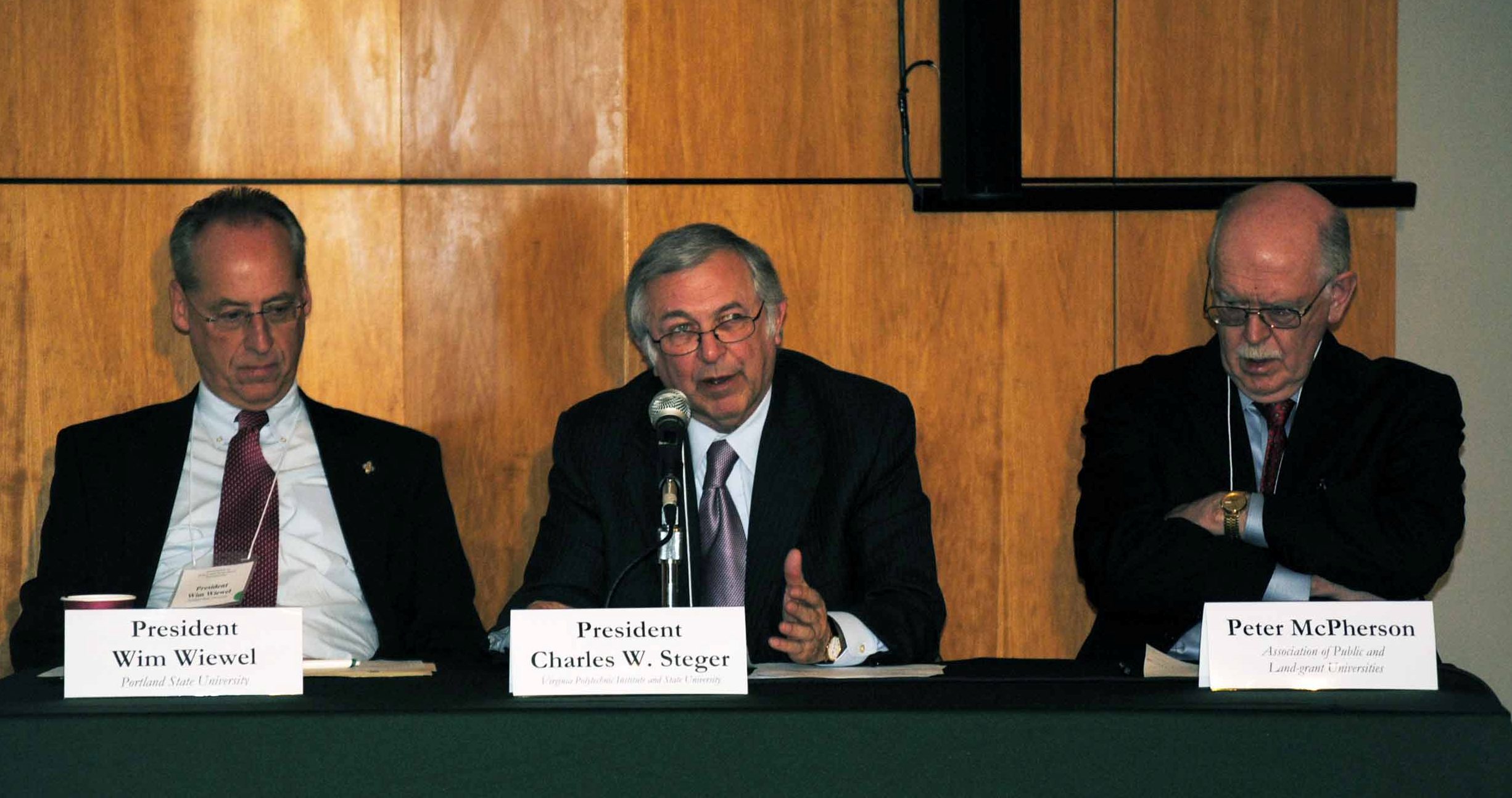Virginia Tech launches transatlantic partnership to advance city-university collaboration for urban sustainability

The Virginia Tech Energy Efficiency Partnership has joined with the Association of Public and Land-grant Universities (APLU), and the Coalition of Urban Serving Universities to launch the Transatlantic Urban Partnership for Energy Efficiency to advance proximity-based city-university partnerships for urban sustainability.
The group recently convened an initial delegation at the Washington, D.C. offices of the APLU featuring city-university pairs from the Netherlands, Sweden, and Switzerland who presented at a forum alongside U.S.-based partnerships, including Pennsylvania State University and Philadelphia, Portland State University and Portland, Ore., and Washington D.C. and the University of the District of Columbia, and its partner institution, Virginia Tech.
Case studies highlighted the way cities and universities are effectively partnering to promote innovation and implementation in energy efficiency projects in their respective regions. More than 130 stakeholders from business, academia, local government, and the non-profit sector took part in the forum.
The European success stories highlighted Lausanne’s 40 percent reduction in greenhouse gas emissions over a period of six years; a major collaborative project in Stockholm in the development of a new sustainable community significantly facilitated by technical engineering and social science support from the Royal Institute of Technology, and innovative mechanisms for consultation among municipal officials and university researchers developed in the Netherlands to advance energy efficiency and sustainability.
Three domestic success stories related to high performance buildings, smart grid, and advanced urban transportation systems were also showcased at the meeting. District of Columbia Mayor Vincent Gray; other city government representatives; Allen Sessoms, president of the University of the District of Columbia; and members of his staff also spoke at the event.
Later in the day, a congressional briefing, "City-University Partnerships for Urban Sustainability: European Success Stories” sponsored by the Environmental and Energy Study Institute took the European delegation and their U.S. counterparts to the Rayburn House Office Building on Capitol Hill, where the Europeans presented on how innovative city-university partnerships can save money for consumers and businesses by improving services and quality of life, creating jobs, and addressing local and global environmental problems.
The discussion focused on lessons learned from local governments and universities collaborating on research agendas and training programs, as well as on innovative ideas that local governments can easily access and apply to meet local needs and promote economic prosperity.
Addressing the morning session that launched the new Transatlantic Urban Partnership, Virginia Tech President Charles W. Steger said, “As a land grant university, Virginia Tech has a history of civic engagement on technology issues. Now, as energy and environmental issues move to the forefront, we view such partnerships as a natural and relevant next step in terms of outreach, research, and teaching. Indeed, land-grant universities can serve as a major resource for managerial and policy change at the city level.
“We foresee prospects for ongoing, applied research that focuses on solving specific local, urban problems and for providing new and exciting educational opportunities for our students as well as playing a role in further educating city officials and workers about the issues and providing training in the emerging technologies,” Steger said.
Steger said that like building owners in any locale, universities have a real economic incentive to find the most effective means to control energy costs and reported that Virginia Tech has achieved an almost 10 percent decrease in annual energy use in the last three years. (Virginia Tech is committed to becoming a leader in campus sustainability. In June 2009, the Board of Visitors unanimously approved The Virginia Tech Climate Action Commitment Resolution and endorsed the accompanying Sustainability Plan.)
In the National Capital Region, where Virginia Tech has had a presence since 1969, the university has signed a memorandum of understanding with the University of the District of Columbia to advise on green campus infrastructure as well as to codevelop sustainability content for teaching modules in green construction. Academic content will be designed to teach individual social and environmental responsibility in the field, as well as combine craft and management elements.
Steger said he believed that over time the metropolitan District of Columbia area could be turned into one of the nation's leading "green" cities and serve -- along with Portland and Philadelphia -- as models for other communities to significantly reduce energy usage and green-house emissions.
Opening the hour and a half congressional briefing session later that afternoon, Steger offered a short overview of the European city-university success stories discussed during the morning session and concluded by saying that there is a great deal more to be shared between European and U.S. cities and that the establishment of networks for exchange and collaboration would greatly advance the cause of energy efficiency and the cause of sustainability. “In doing so we will establish, I hope, some long term interaction across the Atlantic and, indeed, around the world,” he said.
“City-university partnerships can create the foundation for small business development and entire industrial sectors generating jobs and prosperity wherever they may occur,” Steger said.
The following day, a number of the participants from Europe and the United States also addressed U.S. energy experts from President Barak Obama's administration and relevant federal agencies at the White House Conference Center during a meeting organized by the White House Office of Science and Technology Policy.
In addition to Steger, others from Virginia Tech who attended various sessions during the two day event include: from the National Capital Region, Laurel Colless, director, Virginia Tech Energy Efficiency Partnership, and Fred Krimgold, director, Virginia Tech Center for Disaster Risk Management, who helped organize the events, Saifur Rahman, director, Advanced Research Institute, and Lamine Mili, professor, electrical and computer engineering, and from Blacksburg, John Randolph, professor, School of Public and International Affairs.




